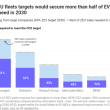In a groundbreaking move, the United Nations’s sexual and reproductive health agency, UNFPA, has launched a pioneering initiative aimed at assisting organisations in enhancing the reproductive health of their employees through the utilisation of the world’s premier sexual and reproductive health ESG (Environmental, Social, and Governance) indicators.
This initiative, introduced in a new publication by UNFPA titled ‘Advancing sexual and reproductive health and rights in the private sector – the case for action and accountability in the workplace,’ introduces a range of novel ESG metrics, functioning as a yardstick for organiations’ endeavors in safeguarding the sexual and reproductive health of their workforce.
Developed in collaboration with Accenture, these indicators gauge organisational performance concerning various sexual and reproductive health aspects, including the prevention of workplace sexual harassment and support for employees’ family planning aspirations.
Dr. Natalia Kanem, Executive Director of UNFPA, emphasised, “Women constitute nearly 40 percent of the global workforce. However, the conventional workplace setup often neglects their needs. Prioritising the health and well-being of women isn’t just morally imperative but also advantageous for businesses. When workplaces accommodate women, they tend to benefit everyone.”
Research conducted by UNFPA suggests that prioritising employees’ reproductive rights is not only socially responsible but also economically beneficial, potentially increasing workplace attendance by over 60 percent, reducing staff turnover by almost a quarter, and boosting overall productivity by more than 20 percent.
UNFPA asserts that safeguarding employees’ sexual and reproductive health necessitates diverse approaches. The adoption of these new sexual and reproductive health indicators enables businesses to tailor their programs and protocols to better suit their employees, whether by strengthening measures to prevent and address workplace sexual violence or implementing policies supportive of family planning and childbirth.
With this initiative, UNFPA aims to steer organisations toward a new dimension of ESG by emphasising the importance of prioritising employee sexual and reproductive health and rights, extending these standards not only internally but also to vendors and suppliers within the supply chain.














